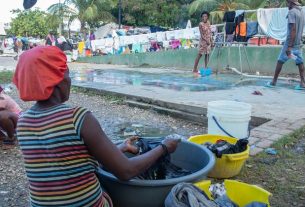Helping young parents go to research events with their partner and baby, granting benefits to those back from maternity, or the right to take domestic abuse leave. These are some of the measures European research organisations have implemented to boost gender equality in the field.
The EU has named four Gender Equality Champions this year, recognising institutions that are setting an example in creating more inclusive, fair and gender-equal research environments.
Addressing the ongoing gender inequalities in research is important as women represent only a third of researchers in the EU, according to the 2024 She Figures report.
It is also essential for the overall quality of European science and research, said Dr Claudia Alén Amaro, head of operations at Instruct-ERIC, a pan-European biology research network and the recipient of one of the two ‘Newcomer’ awards.
“The more diversity there is, the more likely we are to find innovative solutions. You need to have diversity to get diverse ideas,” she said.
Have baby, will travel
The awards are given in three categories – for newcomer, sustainable and inclusive champions – together with a €100 000 prize.
“
The more diversity there is, the more likely we are to find innovative solutions.
Instruct-ERIC was recognised for its “exceptionally high level of reflexivity and impressive staff engagement, driving thoughtful and impactful actions to address critical issues, including sexual harassment, and promote gender equality”.
A particular focus of Instruct-ERIC’s Gender Equality Plan (GEP) – a requirement for all research organisations applying for EU funding since 2022 – was on the challenges experienced by young parents.
It identified helping young parents travel to events as a good way to improve working conditions for female researchers. According to European statistics, they still take on more childcare responsibilities than men.
The team at Instruct-ERIC hopes that by 2026, some delegates to its biennial biology conference will be able to bring not only their babies, but also a partner or babysitter whose travel will be covered by a childcare grant offered by the research network.
Sustained action
The Spanish National Research Council (CSIC) won this year’s ‘Sustainable’ award for long-standing implementation of its extensive GEP that it has had in place for over 12 years.
According to the jury, “its efforts have significantly impacted the promotion of gender equality both nationally and at European level”.
Thanks to its sustained action, CSIC has achieved an overall professional balance of 49.3% men and 50.7% women, with women making up 41% of permanent staff.
But there are still inequalities to address, according to Beatriz Esteban, head of the Delegate Commission for Equality at CSIC.
Around 55% of women are still on temporary contracts. Only 37.6% of researchers in permanent positions and 26.9% of research professors are women. This reflects a lower level of security for female staff.
Implementing the GEP was a challenge for an organisation with 16 000 staff spread out over diverse locations across the country.
“Working in the middle of Madrid is not the same as working in a coastal research centre or on a boat,” said Dr Carmen Mayoral, a chemist and vice president of the Women and Science Commission at CSIC.
To help address the issues raised, the CSIC has set up a network of committees, fostering a bottom-up approach. More than 100 committees are active now, up from around 30 a year ago. Their intention is to use some of the prize money to fund further training actions and their own internal Gender Equality Award.
Data-driven policies
Among this year’s four winners was the University of Gdansk in Poland, which received a ‘Newcomer’ award for its impactful GEP along with Instruct-ERIC.
Much of this was thanks to Dr Ewa Łojkowska, a plant biotechnology professor at the Intercollegiate Faculty of Biotechnology at the University of Gdansk & Medical University of Gdansk.
Together with a group of female scientists, she set out to map the university’s demographics in 2021, providing some preliminary insight into its gender balance situation.
This set the stage for what was to come next.
“No data – no policy, as we say. Once we had data, one of the first realisations was that there were very few women rectors and vice-rectors at our university,” said Łojkowska.
Some of this could be explained by social traditions and perceptions of the role’s heavy workload, as well as long maternity leaves in Poland. But this imbalance is not limited to Poland. The She Figures report shows that even at the European level, women hold only 24% of top academic positions.
In Poland, things are changing rapidly and there are now three women vice-rectors at the University of Gdansk, compared to just one in 2019. Moreover, the progress made in Gdansk has influenced other local universities to improve the gender balance of their senior leadership.
Good for everyone
Łojkowska and her colleagues are keen to ensure that their efforts to achieve gender equality benefit all.
To this effect, the university has been putting in place measures to improve gender equality at all levels, including career mentoring programmes for women, remote working, sharing information on parental care rights, and creating family rooms and leisure spaces such as playgrounds and gyms at the UG Campus.
By encouraging men to take the parental leave they are entitled to, the University of Gdansk is also shifting attitudes to the shared responsibility of parenthood. In 2022, two men, along with 68 women, took their parental leave. In 2024, six men took the leave.
According to Łojkowska, the aim is to be as inclusive as possible. Improving working conditions for women should not mean excluding men.
“We are also thinking about inclusivity for people with disabilities or transgender people. We are just open,” she said. “We would like to show that this gender equality plan will be good not only for women, but for everyone.”
An inclusive future
The Royal College of Surgeons of Ireland (RCSI) received the ‘Inclusive’ award for its GEP.
The jury said it “demonstrated a deep understanding of how different forms of discrimination can intersect and exacerbate each other by explicitly addressing the intersections of gender identity, sexual orientation, ethnicity, and disability”.
For Liz Hughes, head of diversity, equality and inclusion at RCSI, the award sends an important message that to achieve gender equality, it is critical to address systemic inequalities – inherent obstacles that make it more difficult for women to achieve and maintain high-level positions.
“
We would like to show that this gender equality plan will be good not only for women, but for everyone.
RCSI has now achieved gender balance at associate professor level, and a third of full professors are women. That progress was realised thanks to across-the-board measures that addressed institutional structures perpetuating gender inequalities.
Big changes included, for example, releasing academics returning from maternity leave from teaching duties for six months. This allowed them to focus on research.
RCSI also set up mentoring programmes for women and addressed the common issue of imposter syndrome, where good candidates, often women or minorities, do not apply for jobs unless they meet every single requirement.
RCSI is taking steps to encourage applicants not to be deterred by a “confidence gap”.
The university has also introduced paid leave to support those experiencing menopause or domestic violence/abuse.
Along with providing financial support, the gender equality award raises public awareness and helps build a community dedicated to driving institutional change in gender equality.
“The Gender Equality Champion award is not just a nice prize to keep in a cabinet – it’s more than that,” said Mayoral.
“It recognises and validates the efforts of organisations, encourages us to continue and inspires other stakeholders by setting benchmarks of good practices.”
The next call for applications for the Gender Equality Champions awards will open in May, and all relevant information will be available here.
The views of the interviewees don’t necessarily reflect those of the European Commission. If you liked this article, please consider sharing it on social media.
EU Award for Gender Equality Champions
The EU Award for Gender Equality Champions is an annual recognition prize established by the European Commission in 2022 for academic and research organisations that have achieved outstanding results through the implementation of Gender Equality Plans (GEPs).
The award aims to complement the GEP eligibility requirement for Horizon Europe funding and promote inclusive gender equality policies within the European Research Area.
The awards are open to academic and research institutions that:
• have a Gender Equality Plan (GEP) in place that meets Horizon Europe’s eligibility requirements;
• demonstrate measurable progress and impact on gender equality in their policies, culture and practices.
Each winning organisation receives the following:
• Trophy symbolising their achievement.
• €100 000 monetary award to support ongoing gender equality efforts.



